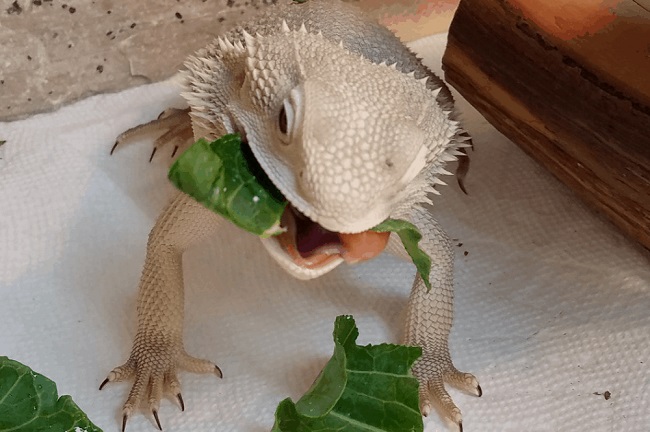As a bearded dragon owner, you want to provide your pet with a nutritious diet. You might be wondering whether it’s safe or beneficial to feed them common vegetables like Romaine lettuce.
This article will provide detailed insights on whether bearded dragons can eat Romaine lettuce, and how it should be incorporated into their diet if it can be.

Can Bearded Dragons Eat Romaine Lettuce?
The simple answer to this question is, yes, bearded dragons can eat Romaine lettuce. However, it should not make up the bulk of their diet.
Lettuce, in general, is mostly water and does not provide much nutritional value. While it won’t harm your bearded dragon, it should be offered alongside other vegetables and insects that contain more nutrients.
Nutritional Value of Romaine Lettuce
Romaine lettuce is high in water content and fiber. It also contains some vitamins and minerals, including Vitamin A and K, potassium, and folate.
While these nutrients are beneficial, the high water content can lead to diarrhea if fed in large amounts. This is why it’s important to balance Romaine lettuce with other nutrient-rich foods.
Feeding Romaine Lettuce to Bearded Dragons: The Right Way
Romaine lettuce should be only a small part of your bearded dragon’s diet. If you decide to feed your bearded dragon Romaine lettuce, it should be thoroughly washed to remove any potential pesticides. You can also tear it into small, manageable pieces for your pet.
Alternatives to Romaine Lettuce for Bearded Dragons
While Romaine lettuce can be a part of your bearded dragon’s diet, there are other vegetables that offer more nutritional benefits. These include:
Mustard Greens: These leafy vegetables are packed with nutrients and are a better option than Romaine lettuce.
Bell Peppers: Bell peppers provide a nice crunch and are also packed with vitamins.
Squash: Both summer and winter squashes are great choices, offering a good mix of vitamins and fiber.
Understanding Bearded Dragons’ Dietary Requirements
Bearded dragons are omnivorous, meaning they eat both plants and meat. In the wild, they consume a variety of insects, smaller animals, and plant material.
In captivity, a balanced diet would comprise approximately 80% fruits and vegetables and 20% proteins like insects.
The proportion may vary depending on the age of the dragon, as younger ones require more proteins for growth while adults need more plant matter. Understanding this balance is crucial in ensuring your bearded dragon’s overall health.
Impacts of an Imbalanced Diet on Bearded Dragons
An imbalanced diet can lead to several health problems in bearded dragons. Too much protein can lead to kidney problems, while a diet lacking in vitamins and minerals can result in metabolic bone disease.
Feeding your bearded dragon too much lettuce, like Romaine, can result in diarrhea due to its high water content.
In contrast, overfeeding of protein sources can lead to obesity. Therefore, the key is to provide a varied diet with appropriate proportions of fruits, vegetables, and proteins.
The Role of Hydration in Bearded Dragons’ Health
While it’s important to monitor the amount of water-rich foods like Romaine lettuce in your bearded dragon’s diet, it’s equally important to ensure they are properly hydrated.
Bearded dragons don’t often drink water from a bowl like other pets. Instead, they may prefer to lap water droplets off leaves or the side of their enclosure. Some bearded dragons may also enjoy a shallow bath.
Conclusion
While bearded dragons can safely consume Romaine lettuce, remember that it should not be the mainstay of their diet due to its high water content and lack of substantial nutritional value.
A balanced diet for a bearded dragon should include a variety of vegetables, fruits, and insects to ensure they get all the necessary nutrients for healthy growth and development.
Always consult with a vet or a pet nutrition expert if you’re unsure about any aspects of your bearded dragon’s diet.
























